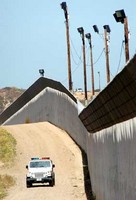Legislators offer bills on rights of immigrants
November 19, 2008
State Rep. Leo Berman is ready for a fight -- a court fight, that is. The East Texas lawmaker filed a bill Monday that would take away citizenship rights of U.S.-born children of undocumented immigrants. He knows the measure would land Texas in court if it passed, and that's exactly what Berman wants.
Written by Brandi Grissom, The El Paso Times

AUSTIN -- State Rep. Leo Berman is ready for a fight -- a court fight, that is.
The East Texas lawmaker filed a bill Monday that would take away citizenship rights of U.S.-born children of undocumented immigrants. He knows the measure would land Texas in court if it passed, and that's exactly what Berman wants.
He hopes a constitutional challenge will make it all the way to the U.S. Supreme Court.
"The 14th Amendment to the U.S. Constitution doesn't pertain to illegal aliens at all," said Berman, R-Tyler.
Berman's measure was one of more than a dozen anti- immigration bills filed in the first week legislators were able to submit proposals for the 2009 legislative session that starts in January. The bills are meant to make life in Texas more difficult for undocumented immigrants and those who would hire them.
After an election in which strong anti-immigrant GOP candidates seemed to suffer the wrath of Hispanic voters, though, some immigrant advocates said chances were slim that some of the measures would succeed next year.
"Being anti-immigrant is not a political winning cause," said Luis Figueroa, legislative attorney for the Mexican American Legal Defense and Educational Fund.
Berman and other Republican legislators are determined to take action against undocumented immigrants this year after seeing dozens of their bills die in 2007.
Likely to be controversial is Berman's proposal to deny citizenship to children born to two parents who are not U.S. citizens.
He said he hoped the measure would spawn a Supreme Court challenge that would clarify the 14th Amendment. The amendment grant s children born in the U.S. automatic citizenship.
Berman said the amendment was never intended to allow undocumented immigrants' children the rights of citizenship.
"Massive numbers of people of the state of Texas want something done about illegal aliens," Berman said.
Among other measures sure to reignite a heated fight from 2007 is a proposal that would require voters to show photo identification at the polls.
Last year, a similar bill passed in the House, but Senate Democrats narrowly defeated it.
Proponents say it's a simple requirement that would safeguard the voting system and prevent noncitizens from casting ballots.
And they hope a U.S. Supreme Court ruling earlier this year in favor of a similar measure in Indiana will mean better luck for the voter-ID measure in Texas.
"For us not to secure the ballot box is not only inappropriate, it's inexcusable," said state Rep. Debbie Riddle, R-Tomball, who filed a voter- ID proposal.
Critics argue that requiring photo ID could disenfranchise poor and minority voters who are less likely to have that kind of documentation. In addition, they say, Texas doesn't have a problem with voter fraud.
"I think we're definitely going to have a big fight on additional voter requirements in Texas," Figueroa said.
Other immigration-related bills filed early include ones that would punish employers who hire undocumented workers, allow state and local law enforcement to make immigration arrests and require undocumented students to pay more for college.
El Paso immigration attorney Kathleen Walker, past president of the American Immigration Lawyers Association, warned lawmakers last year against implementing such measures.
Sanctioning employers, she said, could drive companies away from Texas, as it has done in states like Arizona and Oklahoma.
Allowing police who have no training in immigration law to make arrests of suspected undocumented immigrants, Walker said, could set up law-enforcement officers for civil-rights lawsuits.
"Talk about (racial) profiling out the ying-yang," she said.
Westsider Manuel Rivera said that the U.S. immigration system is a problem, but that Texas lawmakers' proposals aren't the solution.
He especially disliked proposals to require more ID from voters.
"It's a Republican way to deny the vote to minority groups, which are probably going to vote Democratic," he said.
But Michael Walsh, who also lives on the West Side, said he thought Texas should do all it can to crackdown on undocumented immigrants, because the federal government has failed to do so.
"If we can't stop them," Walsh said, "let's make it as uncomfortable and unappealing as we can to come over illegally into this country."
![]()
![]()
Related Stories
![]()
Fair Use Notice
This site contains copyrighted material the use of which has not always been specifically authorized by the copyright owner. We are making such material available in our efforts to advance understanding of environmental, political, human rights, economic, democracy, scientific, and social justice issues, etc. We believe this constitutes a "fair use" of any such copyrighted material as provided for in section 107 of the US Copyright Law. In accordance with Title 17 U.S.C. Section 107, the material on this site is distributed without profit to those who have expressed a prior interest in receiving the included information for research and educational purposes. For more information go to: http://www.law.cornell.edu/uscode/17/107.shtml. If you wish to use copyrighted material from this site for purposes of your own that go beyond "fair use", you must obtain permission from the copyright owner.